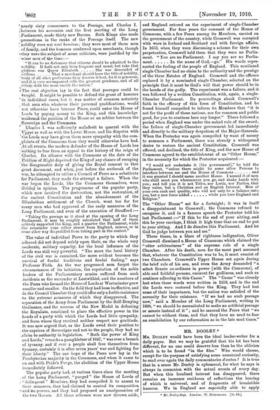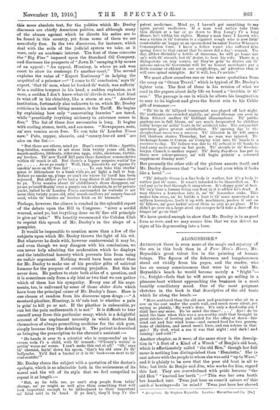MR. DOOLEY.*
Ma. DOOLEY would have been the ideal leader-writer for a daily paper. But we may be grateful that his lot has been different, for no one could deserve less than he the oblivion which is to be found "in the files." Who would choose, except for the purpose of satisfying some unnatural curiosity, to read over again the daily commentaries d'antan ? It is true that in a sense Mr. Dooley is ephemeral, for what he says is always in connexion with the actual events of every day. But when this localised interest has disappeared, there remains an immense residuum of reflections the bearing of which is universal, and of fragments of irresistible humour. We in England are especially able to apply • Mr. Dooley Says. Loudon: W. Heinemann. [3a. 6d.]
this more absolute test, for the politica which Mr. Dooley discusses are chiefly American politics, and although many of the abuses against which he directs his satire are to be found in this country, yet from some of them we are mercifully free. In the two discourses, for instance, which deal with the evils of the judicial system we take, as it were, only an academic interest. The first of these concerns the " Big Fine " imposed upon the Standard Oil Company,
and discusses the prospects of " Jawn D." escaping it by means of an appeal : " An appeal, Hinnissy, is where ye ask wan
coort to show its contempt f'r another-coort." The second explains the value of "Expert Testimony " in .helping the acquittal of a prisoner :—" 'I come to th' conclusion,' says th' expert, 'that th' man, when he hooked th' watch, was sufferin' fr'm a sudden tempest in his head, a sudden explosion, as it were, a sudden I don't know-what-th'-divvle-it-was, that kind iv wint off in his chimbley, like a storm at sea.' " Another institution, fortunately also unknown to us, which Mr. Dooley criticises in his most biting manner, is the Tariff. He begins
by explaining how only " enervating luxuries " are taxed, while "practically ivrything nicissery to existence comes in free." The list of these free necessaries is long. It begins with curling stones, teeth, and sea-moss. "Newspapers, nuts, an' nux vomica ar-re free. Ye can take th' London Times
now." Pulu, zapper, alazarin, and "canary-bur-rd seed" are also on the list :—
" But there are others, mind ye. Here's some iv thim : Apatite, hog-bristles, wurruks iv art more thin twinty years old, kelp, marsh-mallows, lifeboats, silkworm eggs, stilts, skeletons, turtles, an' leeches. Th' new Tariff Bill puts these familyar commodyties within th' reach iv all. But there's a bigger surprise waitin' for
ye Ar-re ye ready ? Well, thin, joss-sticks an' opyum f'r smokin' ar-re on th' free list ! Ye can take this sterlin'
piece iv lithrashoor to a bunk with ye, an' light a ball iv hop. Befure ye smoke up, p'raps ye can't see where th' tariff has been rejooced. But afther ye've had a long dhraw it all becomes clear to ye. Ye'er worries about th' childthren's shoes disappear, an' ye see ye'ersilf floatin' over a purple sea iv ablvarin, in ye'er private yacht, lulled be th' London Times, surrounded be wurruks iv art more thin twinty years old, atin' marsh-mallows an' canary-bur-rd seed, while th' turtles an' leeches frisk on th' binnacle."
Perhaps, however, the climax is reached in the splendid report of the debate upon the Bill in Congress : "niver a sordid wurrud, mind ye, but ivrytbing done on th' fine old principle iv give an' take." We heartily recommend the Cobden Club to reprint this speech of Mr. Dooley's in the shape of a pamphlet.
It would be impossible to mention more than a few of the subjects upon which Mr. Dooley throws the light of his wit.
But whatever he deals with, however controversial it may be, and even though we may disagree with his conclusions, we can never help admiring the moderation which he displays and the intellectual honesty which prevents Mel from using an unfair argument. Nothing would have been easier than for Mr. Dooley to make Use of his peculiar gifts of satirical humour for the purpose of creating prejudice. But this he never does. He prefers to state both sides of a question, and it is sometimes only from a sly hint or two that we can gather
!which of them has his sympathy. Every one of his argu- ments, too, is enlivened by some of those obiter dicta which have been the principal cause of Mr. Dooley's fame. Here is one chosen at random from his discourse upon drugs :—" A
mustard-plasther, Hinnissy, is tb' rale test iv whether a pain is goin' to kill ye or not. If the plasther is onbearable, ye can bet the pain undherueath it is not." It is difficult to tear oneself away from this particular essay, which is a delightful account of the unpleasant necessity in which doctors find themselves of always prescribing medicine for the sick poor, simply because they like drinking it. The patient is described as bringing the prescription to the chemist's assistant :—
"He hands it over to a scientist who is compoundin' an ice- cream soda f'r a child, with th' remark: 'O'Leary's writiu' is gettin worse an' worse. I can't make this out at all.' Oh,' says th' chemist, layin' down his spoon, 'that's his old cure f'r th' bellyache. Yell find a bucket iv it in th' back-room next to th' coal-scuttle."
Mr. Dooley closes the subject with a quotation of the doctor's apologia, which is so admirable both in the seriousness of its moral and the wit of its style that we feel compelled to repeat it at length :— " But, as he tells me, ye can't stop people from takin' &rugs, an' ye might as well give thim something that will look important enough to be inthrojuced to their important an' fatal cold in th' head. If ye don't, they'll leap f'r the patent medicines. Mind ye, I haven't got annything to istor again patent medicines. If a man wud rather take thim thin dhrink at a bar or go down to Hop Lung's f'r a long dhraw, he's within his rights Manny a man have I known who was a victim iv th' tortures iv a cigareet cough who is now livin' comfortable an' happy as an opeem-fiend lw takin' Doctor Wheezo's Consumption Cure. I knew a fellow want who suffered fr'm spring fever to that extent that he niver did a day's wurruk. To- day, afther dhrinkin' a bottle of Gazooma, he will go home not on'y with th' strenth, but th' desire, to beat his wife. There is -a dhrug-store on ivry corner, an' they're goin to dhrive out th' saloons onless th' Govermint will let us honest merchants put a little cocaine or chloral in our cough-drops, an' advertise that it will cure spinal minigitis. An' it will, too, f'r awhile."
We must allow ourselves one or two more quotations from the essay on "Ocean Travel," which is typical of Mr. Dooley's lighter vein. The first of these is his version of what we read in the papers about daily life on board a " levithin iv th' !
seas." The passage is one in which he allows his imagination to soar to its highest and gives the freest rein to his Celtic gift of romance :- "Th' tie in th' billyard tournymint was played off last night. Th' resthrants are crowded nightly, an' great throngs are seen in Main Sthreet undher th' brilliant illuminations. Th' public gardens are in full bloom, an' are much frequented be childher rollin' hoops an' sailin' boats in th' artificial lake. The autymobilt speedway gives gr-reat satisfaction. Th' opening day iv the steeplechase races was a success. Th' illivator in th' left annex fell thirteen stories Thursday, but no wan was injured. T!i brokerage house iv Conem an' Comp'ny wint into th' hands iv a receiver to-day. Tit' failure was due to th' refusal iv th' banks to lend anny more money on hat pools. Th' steeple iv th' Sweden- bOrjan Church is undher repair. Th' Daily Fog-Horn has put in three new colour-presses, an' will begin printin' a coloured supplement Sunday next."
But presently the other side of the picture asserts itself, and Mr. Dooley discovers that "a boat's a boat even whin it looks like a hotel " :—
" Atlantic Ocean is a fine body iv wather, but it's a body iv wather just th' same. It wasn't intended to be thravelled on. Ye cud put ye'er foot through it annywhere. It's sloppy goin' at best. Th' on'y time a human being can float in it is afther he's dead. A man throws a horseshoe into it, an' th' horseshoe sinks. This makes him cross, an' he builds a boat iv th' same mateeryal as a. millyon horseshoes, loads it up with machinery, pushes it out on th' billows, an' goes larkin' acrost thim as aisy as ye plaze. If he didn't go over on a large steel sky-scraper he'd take a dure off its hinges an' go on that."
We have quoted enough to show that Mr. Dooley is in as good form as ever, and we may assure him that we can detect no signs of his degenerating into a bore.



































































 Previous page
Previous page